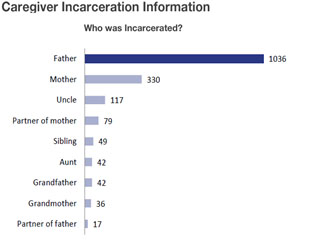An estimated 1.7 million youth younger than age 18 have at least one parent currently in prison in the United States, and millions more have a parent currently in jail. Incarcerated parents and their children are a diverse group, and associations between parental incarceration and developmental outcomes are complicated. Research has shown that having an incarcerated parent can present individual and environmental risks for the child and increase the likelihood of negative outcomes.
OJJDP awarded grants to a practitioner-researcher partnership to develop and evaluate new mentoring practices that serve the needs of youth whose biological parent, legal guardian, or informal primary caregiver is incarcerated in a prison or jail. The study regarding the effectiveness of the mentoring practices is ongoing; however, the research team has collected detailed information about a large sample (1,350 children) from states across the country whose parents are incarcerated.
Because there is no national survey of children with incarcerated parents, this large sample is increasing the juvenile justice field’s understanding of the unique strengths and needs of this population. Following are highlights of the current data:
- Fourteen percent of the children did not know about their parent’s incarceration.
- Twenty-four percent of the children have had more than one incarcerated caregiver at some point in their lifetime.
- Although fathers comprise the majority of incarcerated parents, mothers and other caregivers (such as aunts and uncles, a parent’s partner, and grandparents who serve as caregivers) are also incarcerated.
- The majority of the sample experienced risk factors in addition to having an incarcerated parent (e.g., school discipline problems, delinquency, antisocial peers, social exclusion, and/or a parent in poor health).
- The youth in the survey also had a diverse array of protective factors (e.g., afterschool activities such as sports, music, or theater; religious or spiritual involvement; a caring family or adult community; a supportive nonparental adult; and/or stable access to the Internet).
 Stump, K.N., Stelter, R.L., Kupersmidt, J.B., and Rhodes, J.E. 2018. Mentoring Children of Incarcerated Parents Demonstration Project: August 2018 Data Update for Mentee Characteristics.
Stump, K.N., Stelter, R.L., Kupersmidt, J.B., and Rhodes, J.E. 2018. Mentoring Children of Incarcerated Parents Demonstration Project: August 2018 Data Update for Mentee Characteristics.These and other data from the survey and forthcoming findings on mentoring practices will provide important insight into strategies for fostering positive family engagement between incarcerated parents and their children, as well as best practices for prevention and intervention programs targeted to the unique needs of this population.
Resource:
For more information about the Mentoring Children of Incarcerated Parents Demonstration Project, visit the OJJDP website.
